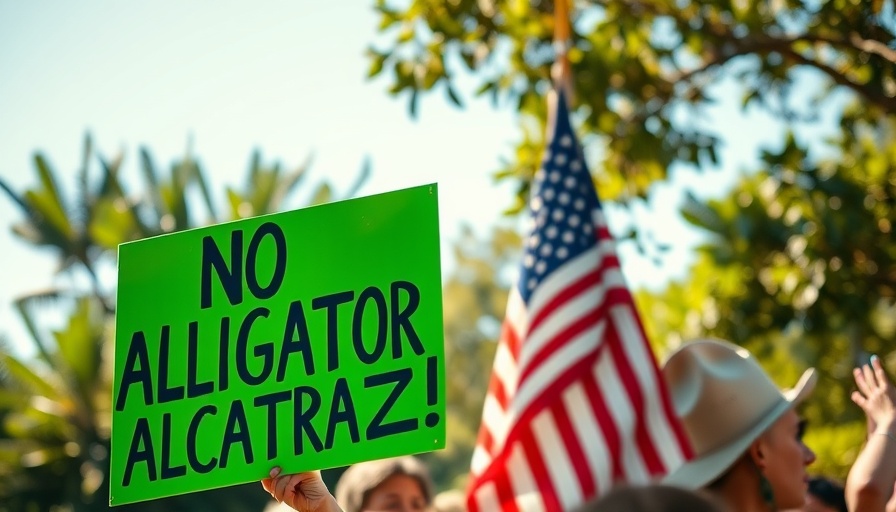
Community Outcry in the Heart of the Everglades
In a striking display of activism, hundreds gathered outside an airstrip in the scenic Florida Everglades on Saturday, uniting against the construction of what has been dubbed 'Alligator Alcatraz' — a controversial immigrant detention center. This coalition of groups, including environmental activists and Native American representatives, expressed deep concern not only for the delicate ecosystem of the Everglades but also for the social implications of the detention facility.
Balancing Environmental Protection and Social Justice
As protesters lined U.S. Highway 41, they waved signs advocating for the preservation of their ancestral lands and the protection of endangered species in the wetlands. Christopher McVoy, an ecologist and city commissioner, highlighted the intertwining issues of environmental degradation and community welfare; he observed a continuous flow of trucks delivering construction materials while listening to the emotional stories of those affected. "People I know are in tears, and I wasn't far from it," he remarked, emphasizing the palpable distress these developments have caused.
The Dangers of Rushed Development
The project's rapid progress stems from an executive order issued by Gov. Ron DeSantis, allowing state officials to bypass certain purchasing laws. This has not only accelerated the construction timeline — which aims for 5,000 immigration detention beds by early July — but has also sparked clashes between governmental authority and grassroots advocacy. With temporary facilities involving heavy-duty tents and trailers now under construction, the sense of urgency is juxtaposed with a profound sense of vulnerability from the community.
Two Perspectives: Security vs. Community
Supporters of the detention center argue that its remote location, populated with wild alligators and other unique wildlife, serves to enhance security. This concern for safety, however, is outweighed by the opposition's focus on the environmental, ethical, and psychological impacts of detaining immigrants in this natural habitat. Protests not only reflect a commitment to environmental protection but a call for humane immigration practices.
Taking Action: What You Can Do
As the situation unfolds, local residents and readers concerned about the future of the Everglades can play a pivotal role. Engaging in community dialogues, participating in peaceful demonstrations, or even reaching out to local leadership to express concerns can help amplify the voices of the protesters. With the window for making impactful changes narrowing, every action counts as the community actively seeks to protect both the environment and its most vulnerable members.
Understanding the intersection of environment and immigration will be crucial as we move forward. For those living on the Suncoast, this is not just a local issue but part of a national conversation about values and priorities. Let's keep the dialogue open and ensure that our actions reflect a commitment to both social justice and environmental stewardship.
 Add Row
Add Row  Add
Add 


Write A Comment